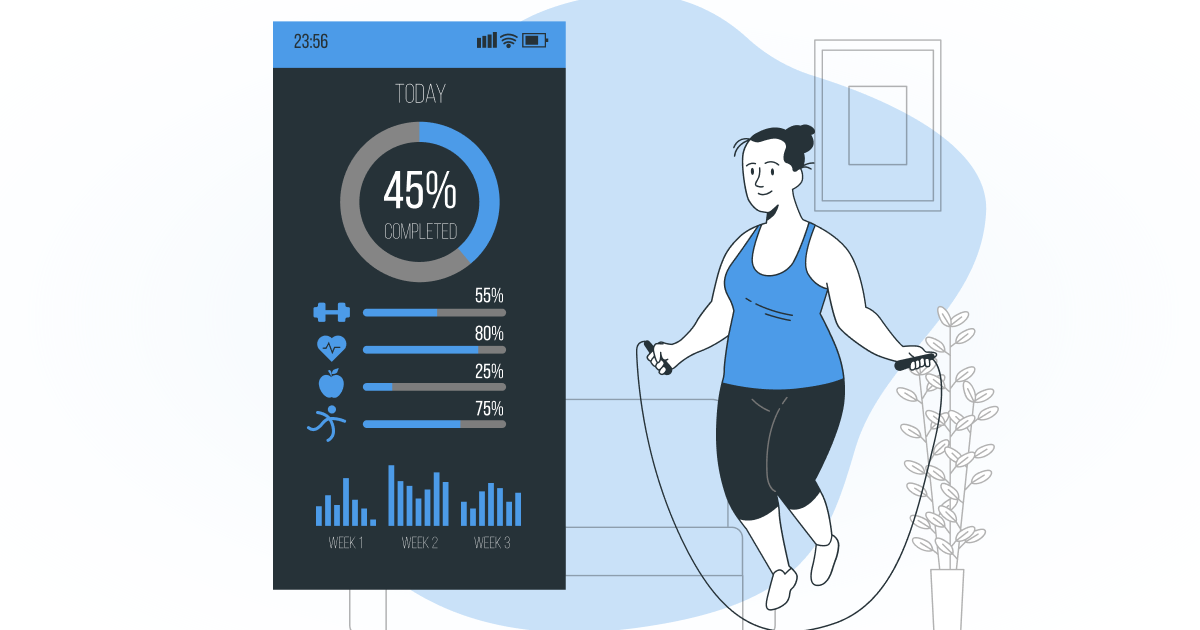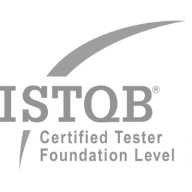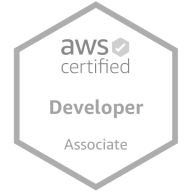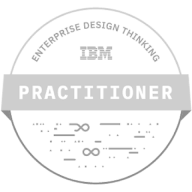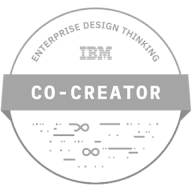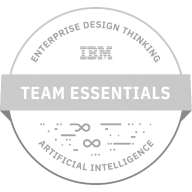
Want to know more? — Subscribe
Mental health app development is rapidly addressing the global mental health crisis. According to the World Health Organization, nearly 1 billion people suffer from a mental disorder. Alarmingly, in low-income countries, over 75% of these individuals do not receive the treatment they need. So, where can individuals seek support? Through innovative mental therapy applications!
In this article, we're going to talk about trends in mental health app development, all the features it needs to have, its cost, security, and tech stack, based on Softermii's experience in developing mHealth apps from scratch, such as MedRealtime and My Health Explained.
Mental Health App: Trends 2023
Before answering the question of how to create a mental health app, consider the latest trends in mental health technologies. While the mental health crisis is sadly on the rise, the development and, most importantly, usage of mental health apps are also accelerating exponentially.
That's good news for mental health as these types of apps can help people find balance, enhance their progress outside therapy sessions, deal with anxiety, stress, sleep deprivation, and other mental health issues.
Vaile Wright, Ph.D. senior director for health care innovation at American Psychological Association, states that "A lot of work that happens in therapy actually happens outside the therapy office. Apps can facilitate that work. They can also help patients address co-occurring problems like insomnia or serve as booster sessions once therapy has ended."
Current mental health app trends address different kinds of psychological concerns and behavioral issues. These apps solve a wide range of problems but can usually be categorized into the following types:
Read Also: How To Build a Music Streaming App: A Comprehensive Guide
Self-Management Apps
In this type of mental health disorders' app, users measure the whole problem-solving path themselves, from providing the app with all the needed information to setting up medication reminders, managing anxiety, stress, or sleeping disorders themselves according to the app's settings and tips. It can also be connected to wearable devices to measure heart rate, sleeping cycles, blood pressure, etc.
Read more: Augmented Reality in Healthcare: Top Applications, Benefits & Future
Apps for Improving Cognitive Skills
These types of apps help users to improve their thinking skills. They can come in handy for people suffering from depression or post-covid syndrome, improving memory and concentration with special exercises.
Read Also: Cost of Telemedicine: Is It a Worthy Investment?
Illness Management and Care
These apps aim to connect the patient with a health care provider or trained specialist who can offer counsel, check the progress, propose treatment options, or administer urgent care. They also offer the diary option with notifications and reminders, where patients can record symptoms, treatment effect, medications, mood tracker progress and health stats.
Symptom Tracker
Symptom tracker app development helps collect users' data, such as behavioral patterns, social interactions, physical activity, sleeping cycles, etc. These apps are not meant to diagnose or replace a mental health professional but to provide a caregiver with additional information about the patient and alert specialists when the client needs extra attention or urgent help.
Insomnia Management
According to the Centers for Disease Control and Prevention (CDC), 1 in 3 adults don’t get enough sleep each night, thus such apps could be a valuable tool to help people achieve better sleep, deal with their sleep problems and manage their sleep deprivation. Some sleep apps offer relaxing sounds, such as white noise, music, nature sounds, and guided meditations and storytelling, for sleepers to listen to as they try to fall asleep. Other apps act as alarm clocks with more features collecting data as the user sleeps.
Stress Management and Mood Control
These types of mental health apps are specially designed to control and track mood swings throughout the day, trace cycles, better understand feelings or experiencing anxiety, depression, or high levels of stress. Similar to how some people decide to improve their physical shape, such mental health apps help to get into a better mental state. These kinds of apps may also offer actionable insights into what affects mood on a daily basis, and provide strategies for feeling better.
Read Also: 15 Best Healthcare App Marketing Strategies
Relaxation and Meditation Apps
The name of these apps speaks for themselves – they usually share a
number of available programs and audio classes taking the user through
meditation sessions, breathing exercises, relaxation, mindful movements, and
better sleep.
Must-Have Features of Mental Health App
Elaborated mental health app design can help mental health providers maintain a constant connection with their patients to understand their mental state and current needs better, reduce the workload on therapists and psychiatrists, and reach a wider audience. It's also necessary to understand that the users can be of any age and background. Thus it's important to create a mental health tracking app UX as user-friendly as possible. So, when you decide to create a mental health app, note that it should have the following mental health app features for users:
1. Self-monitoring
Mental health apps can be helpful to track overall wellbeing as well as monitor mental health disorders. This feature can be useful to record sleeping cycles, mood patterns, symptoms, meals and physical activity, thoughts, feelings, etc.
Users can analyze data themselves or hand them over to a specialist. You can also add calendar and checklist features to make self-monitoring more user-friendly and convenient.
2. Diary
Any mental health app aims to improve users' quality of life. The diary feature will help express and record thoughts and give the space to outburst all kinds of emotions. The diary has to have a regular typing feature, a drawing feature for those who can better express emotions in pictures, and audio notes for people preferring speaking and for those with dyslexia and dysgraphia. Also, consider adding the ability to share notes with a specialist through the app or another platform.
3. Video & Audio Content
It's a good idea to add additional video and audio content features, where there's no need for a therapy session or urgent help. It can have soothing aspects, lifting mood and cheering up affirmations, educational purpose, relaxing and stress release, mitigating symptoms or preventing exacerbation stages, sleep deprivation management, etc.
Also, patients and practitioners can attach video and audio files from their sessions if they need to watch them again. So, this feature must be added when creating a mental health app.
4. Sign-up and Profiles
The very first step of designing a mental health app is to add sign-up and profile features. Sign up process should be easy and seamless as it’s a user’s first interaction with your solution.
Read more: Hospital Cybersecurity Checklist: 10 core steps that you need to check now
On the other hand, profile settings should include all the needed information for using the app – full name, contacts, age, gender, disorders, chronic illnesses, allergies, intolerances, etc. Also, if this is going to be a patient’s profile used by specialists, consider adding a file uploading feature to provide the possibility of tests and reports attachments.
5. Sharing
This feature allows users to share their progress, thoughts, and ideas to social media or send them directly to their caregiver, needed specialist, and family member. Some users appreciate the feature of mood sharing to different social networks and show their progress in overcoming mental health crises. Also, it can be useful to provide a possibility to export users' data in different formats and send it via email.
6. Notification and reminders
Adding these features when developing a mental health solution may remind users to check on their mental state throughout the day, do exercises, take medicine, practice relaxation, notify about meeting with a specialist, encourage and cheer up, etc. However, it is important not to overdo, as psychologists state that too many notifications and reminders add additional stress to the everyday routine.
7. Third-Party Integrations
Depending on the type of mental health app, you can also want to measure some physical indicators like heart rate, activities, sleeping cycle, blood pressure, etc., and attach it to the user's profile. For these features, you'll need to establish a connection between your app and wearable devices. To do so, you'll need an healthcare API like HealthKit from Apple, which provides data transfer from fitness apps and devices. Also, there are other helpful tools and useful technologies that can come in handy when you decide to develop an app to track mental health, such as Google Calendar, Nylas, Zoho for calendar feature, OneSignal or Pusher for notifications, Sendbird, Stream, or Vonage for chats, Agora, Twilio or VidRTC for video sessions.
Read more: HL7 Integration: A Healthcare Standard Overview
Mental Health Mobile App Data Security
When deciding to develop a mental health app, one of the most important things to look out for is data security. It is still a timid topic, so you have to protect users' privacy very carefully. There are a few mandatory regulations any healthcare solutions have to comply with. They are:
- HIPAA (Health Insurance Portability and Accountability Act of 1996) is the US federal law containing national standards of any health-related data protection. HIPAA compliance is one of the most important regulatory rules when developing any digital health apps or platform. The good thing is that it has a very definite compliance guideline.
- GDPR (General Data Protection Regulation) is a data & privacy EU law that applies not only to healthcare but to all businesses registered in or outside the EU and working with the EU citizens' data.
- PIPEDA (The Personal Information Protection and Electronic Documents Act) is a Canadian data privacy law that defines a relevant security framework for all kinds of businesses collecting personal data and information.
Also, there are steps you should take to prevent data breaches and enable high-level security. Those are:
- Implement multi-factor authentication (password, face ID, fingerprints, voice recognition, phone call/message verification, etc.)
- Use end-to-end encryption so that no one except sender and recipient could read a sent message.
- Set up fraud notifications – let users know if there has been a data leak or if anyone's trying to sign in from a new unidentified device.
It’s also important to educate users on what they should or shouldn’t do to prevent data leaks. Awareness can be very helpful to provide a high level of security in some cases.
Read also: Hospital Cybersecurity Checklist: 10 core steps that you need to check now
Tech Stack of Mental Health App Development
The tech stack of the development may vary greatly depending on the complexity of the project, the number of features, team composition, etc. Though the technologies used may be different, but the basic tech stack is as follows:
- Front-end development: Angular, ReactJS
- Back-end development: Node.js, PHP, Phyton; database - Postgres, MySQL, MongoDB
- Mobile development: Android - Java, iOS - Swift
- Multiple payment modes: Braintree, PayPal, Stripe
- Map integration and user location tracking: Google Maps API, MapKit, CoreLocation
- Push notifications: Push.io, Twilio
- In-app calling and messaging: Twilio
- Cloud environment: Google, Amazon Web Services (AWS), Microsoft Azure.
Challenges of Creating Mental Health App
Understanding and addressing these challenges is fundamental to successfully developing and deploying effective mental health apps:
User Engagement and Retention
One of the foremost challenges in mental health app development is ensuring sustained user engagement. For these apps to be effective, users need to utilize them consistently. However, users may quickly lose interest and abandon the app if the content or user interface needs to be more compelling.
Personalization
Mental health is deeply personal, and what works for one individual may not work for another. Ensuring that apps can be tailored to meet each user's specific needs and preferences is crucial, yet creating such adaptive algorithms and features can be complex.
User Trust and Credibility
Mental health is a sensitive subject. Users need to trust that the app will handle their data with utmost confidentiality and that the advice or support offered is credible. Ensuring the inclusion of evidence-based interventions and robust data protection measures is vital.
Monetization and Sustainability
While it's essential to offer value to users, developers also need to find sustainable monetization models that don't exploit users' vulnerabilities. Striking the right balance between profitability and providing genuine help can take time and effort.
Data Privacy and Security
Given the intimate nature of information shared on mental health apps, there's an increased responsibility to safeguard user data. It requires sophisticated encryption and robust data handling protocols.
Ethical Considerations
Ensuring the app doesn't inadvertently harm users or give misguided advice is paramount. Developers must be wary of potential triggers and ensure interventions are ethically sound and beneficial.
Mental Health App Development Cost
The project complexity primarily influences the cost of the software solution, whether it is a minimum viable product or a finished one. Take a look at the main stages of a mental health app development:
- Discovery — covers the initial analysis of the market, audience, and competitors.
- Specification requirements — a detailed description of the system under development.
- Engineering and design — creating a visual representation of the app before the actual app coding.
- Development — the app concept and type influence the cost of an app during the development stage. More features you want means the app will cost more.
- Testing — testing app function and quality.
- Ongoing support — a long phase of application support, as well as the development of updates.
The cost of each of these mental health app development stages will vary. It will depend on the type of software, its features, tech stack, the difficulty of implementation, team composition, and mental health app developers’ rates.
For example, if the mental health app should have only basic features, like video and audio content, a diary, and self-monitoring with notifications, the price will not be that high. But if you plan to create an app with multiple extra features, the costs will increase. The average cost for developing a custom feature for an app varies depending on the needed additional features.
However, the average cost of the ready-to-use tailor-made mental health app starts from $90000.
Contact us to get your project's cost precise calculations.
Softermii’s Experience
Our team has a wide experience in developing mhealth apps of various types and different complexity. Here are just a few examples of what we’ve done in the last couple of years.
My Health Explained
My Health Explained is a personalized educational mhealth platform available on both the web and mobile devices. This software recommends specific programs with video content and utilizes a highly personalized approach tailored to the user’s specific profile.
Users can effortlessly follow the program, resume where they’ve left off, and receive suggestions based on their own needs. It has received high reviews from healthcare workers and is used by over 11,000 diabetics.
MedRealtime
Another solution we’re proud of is MedRealtime. MedRealtime is a cutting-edge medical software consisting of a web and mHealth booking & telecommunication platforms transforming the way we get healthcare treatment before.
The platform allows patients to get better access to medicine from anywhere & anytime and have the opportunity to choose the needed specialist based on his experience, skills, and patients' reviews.
It’s high time to develop a mental health app!
In our digitally-driven age, mental health apps bridge the gap between individuals and accessible, immediate support. Such apps provide a lifeline to those who might otherwise feel isolated, offering guidance, monitoring, and therapeutic interventions at the touch of a button.
As mental health concerns continue to rise globally, developing these applications becomes paramount, ensuring that help is readily available, destigmatizing mental health, and fostering a world where well-being is prioritized and accessible to all.
These facts only mean that it's high time to build a mental health app!
Contact us, and we will gladly help create mental health solutions for all purposes and any level of complexity. We will discuss the development process, set the milestones and define the budget — give us a call to start working on your project!
Frequently Asked Questions
What are the key factors to consider when creating a mental health app?
Selecting the right technical frameworks and platforms for companies developing a mental health app is crucial. It's essential to ensure seamless functionality, scalability for future growth, and integration capabilities with other health systems or tools. Additionally, a strong focus on user interface and experience design, backed by evidence-based content, can set the foundation for an effective and user-friendly application. Collaborating with a seasoned vendor can provide guidance and expertise during development.
How to ensure the security and privacy of user data in a mental health app?
Ensuring the security and privacy of user data in a mental health app requires a multifaceted approach. Implementing end-to-end encryption, robust data handling protocols, and secure cloud storage solutions is essential. Regular security audits, adhering to global data protection regulations, and keeping the app updated with the latest security patches will also play a vital role in safeguarding user information.
Can I hire Softermii for my mental health app development project?
Absolutely! Softermii boasts extensive experience in software development, particularly in the healthcare sector. Our expertise ensures that we can handle projects of varying complexity, and we'd be delighted to assist you in bringing your mental health app vision to life.
How about to rate this article?
1610 ratings • Avg 4.8 / 5
Written by:











